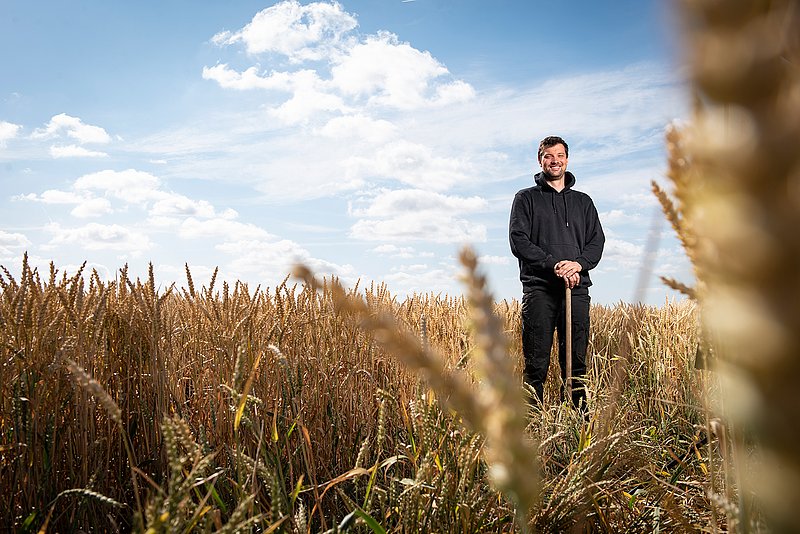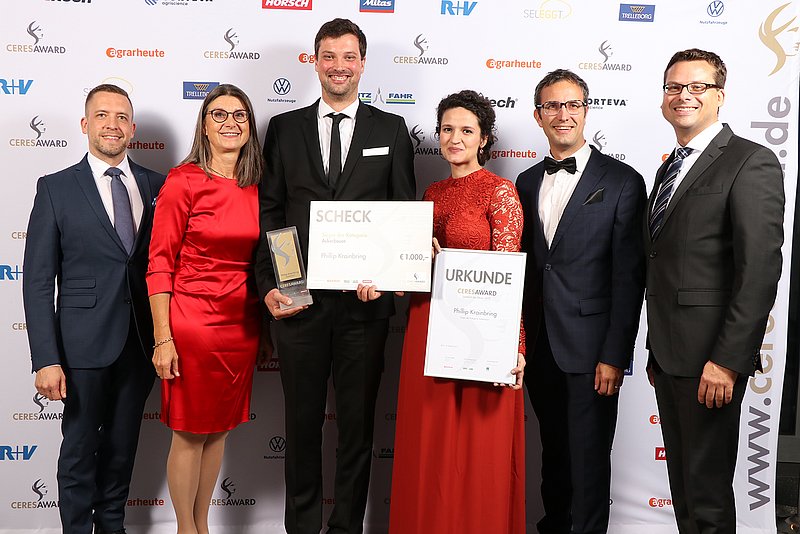
Honest changes
The certified agriculturist Phillip Krainbring wants to familiarise the consumers with agriculture and encourages the dialogue via social media. He surely has enough to tell: Since 2016 he has been managing a 440-hectare commercial farm. As a farm manager he mixes rotation, sees to the optimum selection of varieties, chooses the appropriate application rates and uses modern biologicals.
The 33-year-old farmer uses the best of conventional and organic farming. For cereals and maize, he relies on electron-treated seed and compounds with micro-organisms. More and more often he does without chemical agents and mineral fertilisers. His objective: to use 30 to 50 per cent less nitrogen, reduce fungicides and insecticides by half and use no growth regulators at all. He tells terraHORSCH what motivates him:
„This year I won the CeresAward in the category „Arable farmer“ – something very special for me as my father won the prize in this category in 2015 and now I follow in his footsteps. The Ceres Award offers the opportunity to show which new paths agriculture takes, which innovations we push and which ideas we develop to prepare the agricultural sector for the future. In my opinion, this is very important as we are facing major challenges and changes.
On the one hand, we realise that our production methods are reaching their limits. Be it resistances in plant production, stagnating or declining yields, too large and too heavy machines, extreme weather and lots more. This list could go on endlessly. But we chose these challenges when we chose our job. And this is what makes agriculture so attractive that we constantly develop further and not simply tread water. But in my opinion, all this is not only about the latest machine, the next high-tech solution or digitisation ad nauseam. Further development means to remember topics that do not attract the most attention, for example the soil. The soil can achieve a lot. But, to put it bluntly, in the past we often only considered it as the „carrier substance“ for seed, plant protection and fertiliser. There is a lot of potential we do not yet know and even underestimate.

The CeresAward
Today agriculture more and more becomes the focus of public attention – sustainable use of resources, environment and climate protection are only some of the topics that everyone is talking about within the scope of guaranteeing the food supply. The demand for transparency with regard to the production and the product origin plays a more and more important role.
This is why the CeresAward as the reward for extraordinary achievements of farmers in Germany in eleven different categories came into being. The award is a high-publicity platform to point out the skills and important achievements of farmers in Germany – in the agricultural sector and beyond. The CeresAward ceremony is a gala event that takes place every year. HORSCH is the sponsor of the category „Arable farmer“.
On the other hand, we are suddenly exposed to a societal and political pressure that we would not have thought possible five to ten years ago. Society demands that we radically change the way we farm and the politicians respond to these demands with restrictions and bans. Many people do no longer have any relation to agriculture and they know nothing about today’s production methods. But how should they know? Let’s think about ourselves and about the sectors we are not in contact with. I don’t know anything about the daily routine of a nurse or of a media designer. In the past we simply missed the opportunity to talk about the development of agriculture.

But even though people have little relation to a topic or know little about it, they still talk about it. Exactly this can be our opportunity. The topic agriculture is of interest and we have to make use of this interest. Let’s talk about our work! But not only with figures, facts and scientific documents. We and our work can inspire people. There are so many nice experiences, situations and stories we can proudly talk about. But it has to be honest. We must not whitewash things. Let’s take the plant protection agents as an example. Plant protection agents have side effects – period! As an agricultural scout I visit a lot of cities to talk about agriculture. Plant protection agents or – the more common term – pesticides always are an important topic. If I only talk about how amazing and important these agents are, no-one will listen to me respectively will start arguing against. But if I deliberately mention the side effects, we are entering a completely different level of conversation. We also have to admit that the reduction of plant protection applications is not only to our credit. Regulations, restrictions and bans partly forced us. Therefore, we cannot stand up and demand that we earn all the merit. This is not credible.
We must not wait any longer! We have to enter into the discussion proactively. And it is important that we ourselves approach the critical topics and do not wait until others bring them up. This is the only way how we can have a word in these discussions and shape them. And this is only possible in combination with self-criticism. Those who today still claim that agriculture is ok the way it is and that we do not make mistakes haven’t understood anything. We do not keep animals in a species-appropriate way, we do not work sustainably etc. And yes, we partly bear the blame. Not all of it, of course. But if we ourselves do not approach these topics and show that we are changing something and that we want to continue to change something, the pressure on us will even increase.
I think with honesty, some self-criticism and the will to risk something new we farmers can show that we want to change something from within.“